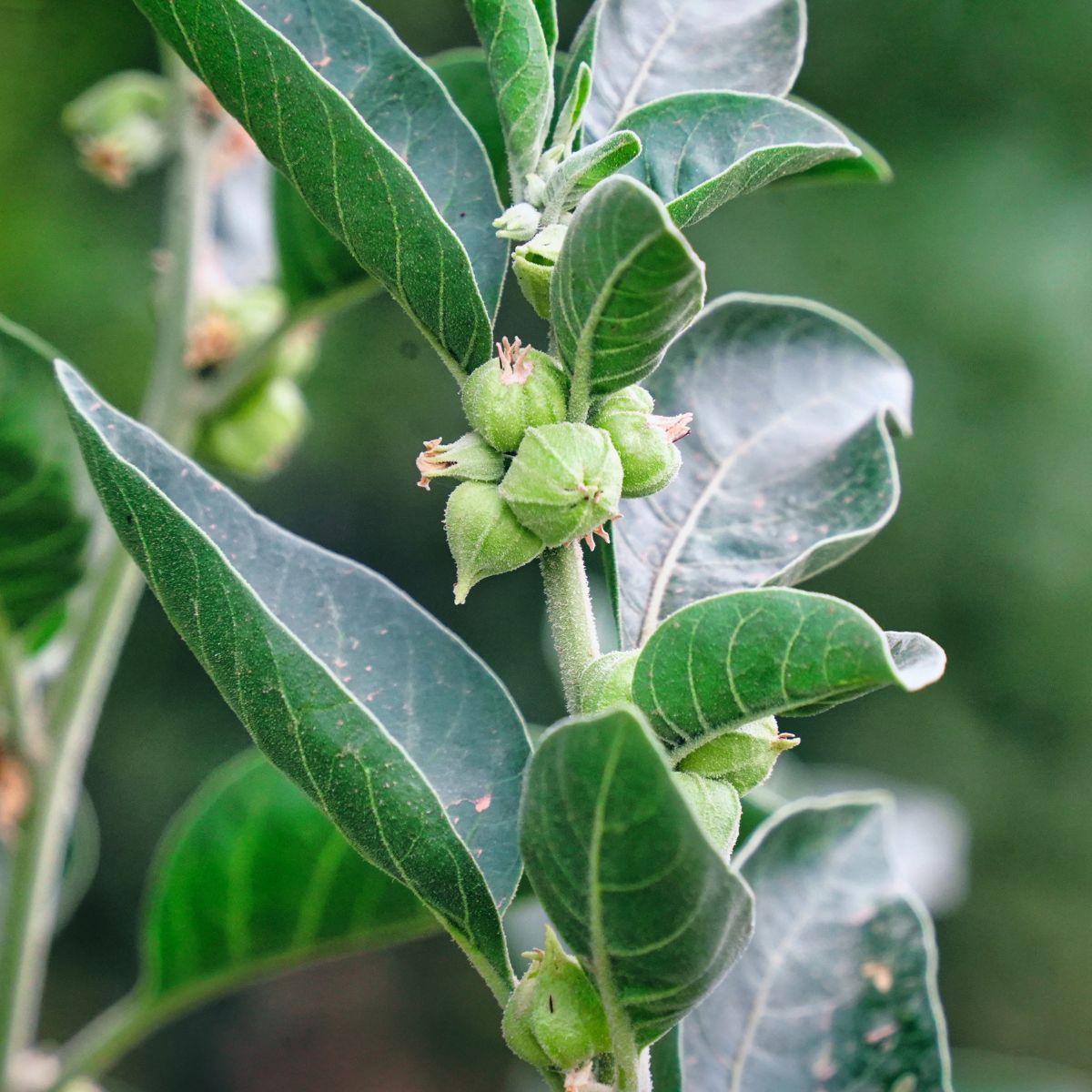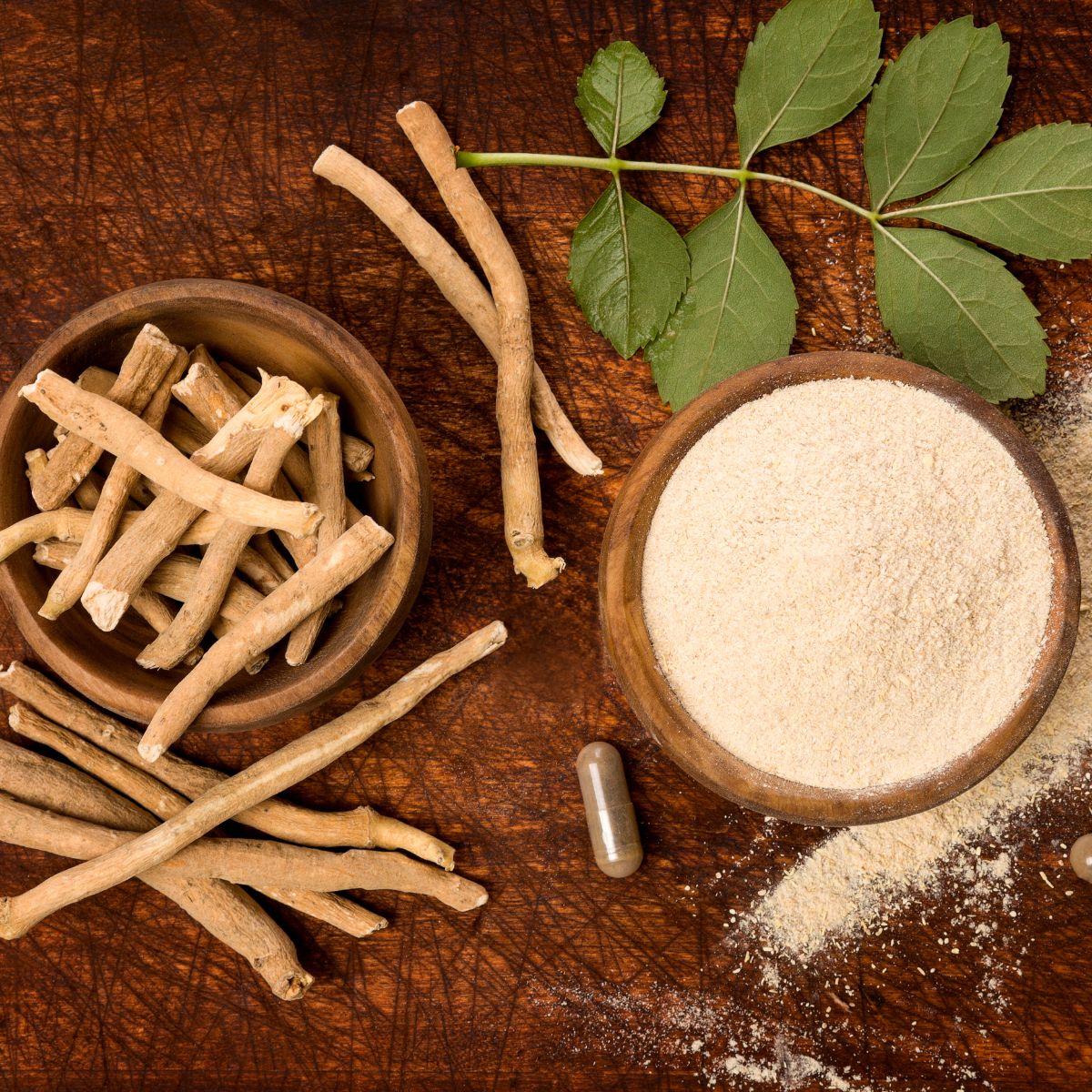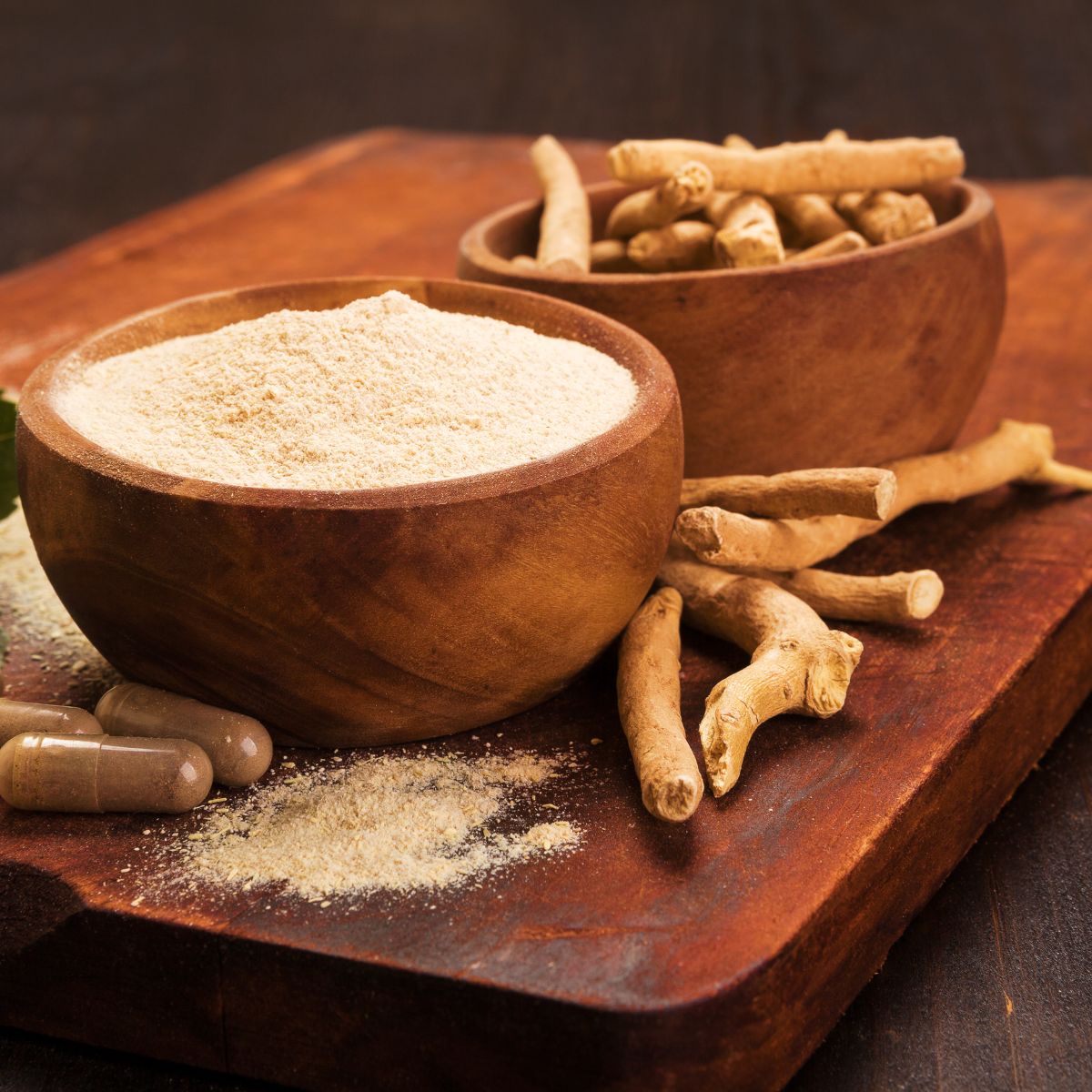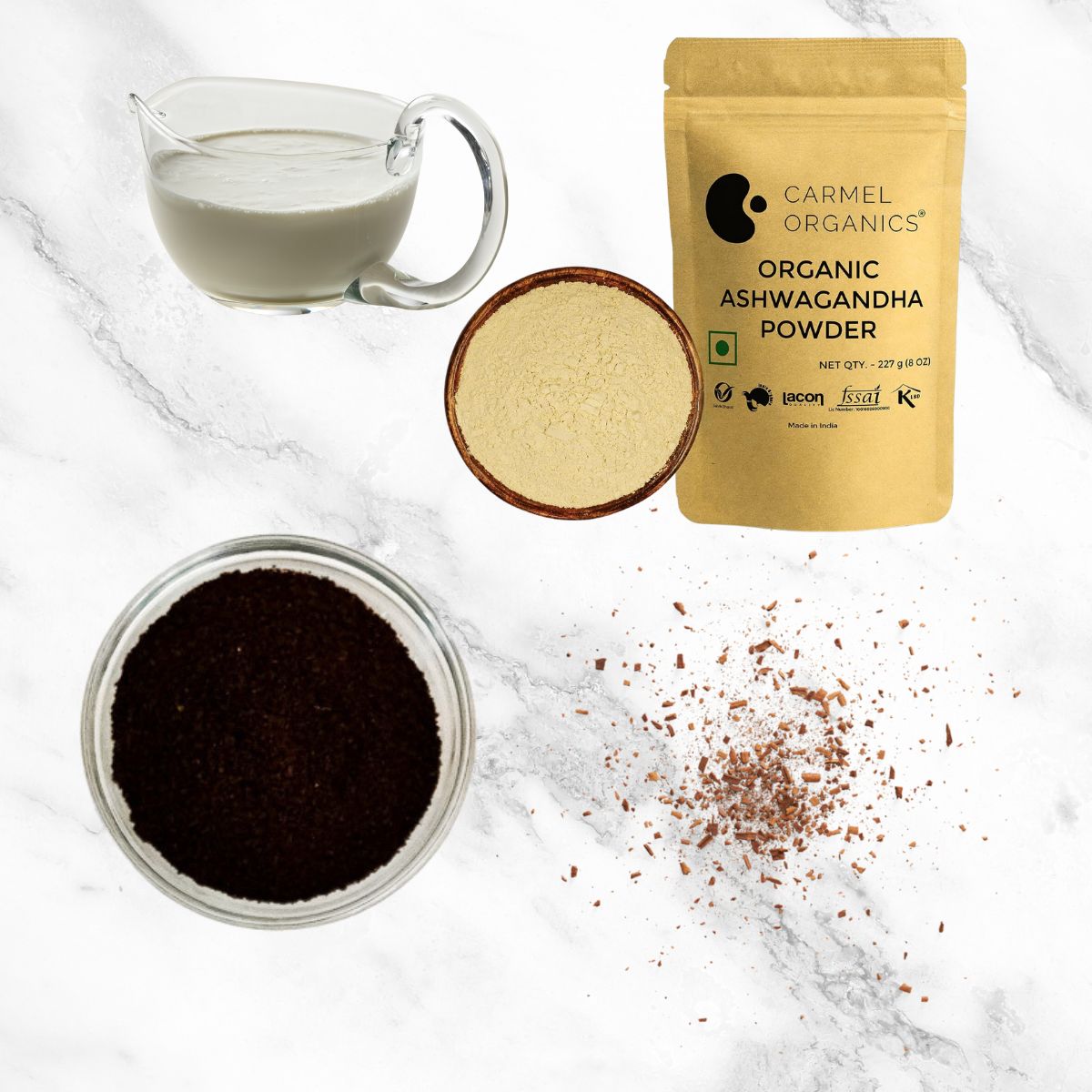Easy Ashwagandha Coffee Recipe – Tasty Adaptogenic Latte
This Easy Ashwagandha coffee is a great addition to your daily routine. The amazing benefits of this powerful herb will help your adrenal health, give you an increase in energy levels and even more restful sleep. Add ashwagandha to your morning cup of joe with this easy, tasty recipe.

Made with the milk of your choice, cinnamon, ashwagandha powder and coffee, this delicious beverage will become the best part of your day.
Jump to:
What is Ashwagandha and Why Might you Want to Incorporate it into your Diet?
Ashwagandha (Withania somnifera) is an adaptogenic herb that has been used for centuries in traditional Ayurvedic medicine, which originated in India. Also known as “Indian ginseng” or “winter cherry,” ashwagandha is classified as an adaptogen, a group of herbs believed to help the body adapt to stress and promote overall well-being. You can consume it in capsule or powder form, and it’s made from the root of the ashwagandha plant.

Here are some of the benefits of ashwagandha.
Stress Relief and Anxiety Reduction
Ashwagandha is known for its potential to reduce stress and anxiety. It is believed to have adaptogenic properties that can help the body better manage and respond to stressors, both physical and emotional.
Energy and Vitality
Ashwagandha is traditionally used to improve energy levels and vitality. It is thought to support overall physical and mental stamina, making it useful for combating fatigue and enhancing endurance.
Cognitive Function
Some studies suggest that ashwagandha might have positive effects on cognitive function, memory, and focus. It is believed to support brain health, brain function and promote mental clarity.
Immune System Support
Ashwagandha is thought to have immunomodulatory effects, meaning it may help regulate the immune system. This can contribute to overall immune system health and function.
Anti-Inflammatory Properties
The herb contains compounds with potential anti-inflammatory effects. This may be particularly relevant for individuals dealing with inflammation-related conditions.
Hormonal Balance
Ashwagandha has been studied for its potential to support hormonal balance, particularly in relation to the endocrine system. It may have a positive impact on hormones that could impact your cortisol levels, thyroid hormones, and sex hormones.
Physical Performance
Athletes and individuals looking to enhance their physical performance might be interested in ashwagandha’s potential to improve strength, endurance, and recovery.
Mood Enhancement
Some research suggests that ashwagandha may have mood-enhancing properties. It might help regulate mood and promote feelings of well-being.
Antioxidant Support
Ashwagandha contains antioxidants that can help protect cells from oxidative stress and damage caused by free radicals.
How long does it take to feel the effects of ashwagandha?

The time it takes to feel the effects of ashwagandha can vary from person to person. Some individuals might experience noticeable effects relatively quickly, while others might require a longer period of consistent use before experiencing any changes. Here are some general timelines to consider:
Short-Term Effects (Within Days to a Week)
Some people report feeling certain short-term effects of ashwagandha within a few days to a week of starting its use. These effects could include a mild sense of relaxation, reduced stress or anxiety, improved sleep quality, or increased energy. However, these effects might be subtle and might not be experienced by everyone.
Long-Term Effects (Several Weeks to Months)
The adaptogenic properties of ashwagandha might take longer to manifest. It’s common for adaptogens to work gradually by supporting the body’s stress response over time. Individuals seeking more profound benefits such as improved energy levels, enhanced cognitive function, or hormonal balance might need to use ashwagandha consistently for several weeks to a few months before noticing significant changes.
Individual Variation
It’s important to note that individual responses to ashwagandha can vary widely. Factors such as metabolism, overall health, dosage, and the specific ashwagandha product being used can influence how quickly the effects are felt. Additionally, the effects of ashwagandha might be more noticeable in people dealing with higher levels of stress, anxiety, or fatigue.
Dosage and Preparation
The dosage and preparation method can also play a role in how quickly the effects are felt. Some products provide higher concentrations of ashwagandha, while others might be more diluted. It’s advisable to start with a lower dosage and gradually increase it if needed to determine how your body responds.
Consistency is Key
Consistency is important when using ashwagandha. The adaptogenic effects might become more pronounced with continued and regular use. If you’re using ashwagandha to address specific concerns, it’s recommended to give it time to work and to consult a healthcare professional if you have any questions or concerns about its effects.
Why you shouldn’t use Ashwagandha

Ashwagandha is generally considered safe for most people when used appropriately and in moderation. However, there are certain situations or conditions in which individuals should exercise caution or avoid using ashwagandha. Here are some reasons why someone might choose not to use ashwagandha:
Pregnancy and Breastfeeding
Pregnant and breastfeeding individuals should exercise caution when using ashwagandha. While limited research is available, there is some concern that ashwagandha might have potential effects on hormone levels and uterine activity, which could impact pregnancy. It’s advisable to consult a healthcare professional before using ashwagandha during pregnancy or breastfeeding.
Autoimmune Disorders
Ashwagandha has immune-modulating effects, which means it might affect the immune system. Individuals with autoimmune disorders, where the immune system attacks the body’s own tissues, should use ashwagandha with caution. It’s recommended to consult a healthcare provider before using it in such cases.
Thyroid Disorders
Ashwagandha might impact thyroid function, particularly by potentially increasing the levels of thyroid hormones. People with thyroid disorders, especially hyperthyroidism, should be cautious when using ashwagandha. Regular monitoring of thyroid function and consultation with a healthcare professional are important.
Surgery
Due to its potential effects on the immune system and hormone levels, individuals scheduled for surgery should stop using ashwagandha several weeks before the procedure. This can help avoid potential interactions with anesthesia and other medications used during surgery.
Medication Interactions
Ashwagandha might interact with certain medications, including those for diabetes, blood pressure, immune system modulation, and sedatives. If you’re taking any medications, it’s important to consult a healthcare provider before using ashwagandha to prevent potential interactions.
Allergies
While rare, some individuals might be allergic to ashwagandha or related plants. If you have known allergies to plants in the Solanaceae family (which includes tomatoes, potatoes, and bell peppers), you might want to exercise caution.
Sensitive Stomach or Digestive Issues
Some individuals might experience gastrointestinal discomfort when using ashwagandha. If you have a sensitive stomach or a history of digestive issues, it’s advisable to start with a lower dosage and monitor your body’s response.
Children
Ashwagandha is not typically recommended for use in children due to limited research on its safety and effectiveness in this population.
Why You’ll Love this Ashwagandha Latte

If you’re a coffee drinker, this warm, sweet drink is the perfect way to start your day. The milk and cinnamon combined with the coffee and earthy taste of the ashwagandha powder creates a perfect balance of flavors and will take your morning coffee routine to the next level. Enjoy it with avocado toast and a side of goji berries, and you might just have the most nutritious breakfast ever.
Ingredients

- Coffee, Espresso or Cold Brew – You can use any type of coffee you want. Dark roast, light roast, decaf, espresso and even cold brew. It’s totally up to you!
- Milk – Again, you can customize this in any way you want. Use the plant-based milk of your choice or regular milk.
- Ashwagandha Powder – we like this one.
- Cinnamon
- Sweetener (optional) – use any type of sweetener that you like. Maple syrup, sugar, honey, flavored creamer, etc.
See recipe card for quantities.
Instructions

Heat milk in a small saucepan over medium-low heat. Do not let it boil. Pour it into your favorite mug.

Stir in Ashwagandha powder, cinnamon and coffee.

Use a milk frother to froth your leftover milk, or shake it in a jar for 30 seconds.

Add foam to top of mug with a dash of cinnamon. Enjoy!
Hint: I seriously couldn’t live without this milk frother. And for less than $8, it’s a no-brainer purchase.
Storage
You’ll want to make this as you drink it. We don’t recommend making a batch in advance and heating it up later.
Top tip
If you’re making an iced latte, be sure to skip step 1 and use cold brew coffee and cold milk. And we’ve found that Skim Milk makes the best cold foam!
FAQ

Ashwagandha coffee is a beverage that combines traditional coffee with ashwagandha, an ancient herb known for its potential health benefits. It aims to provide the energy and alertness associated with coffee while also incorporating the potential stress-reducing and adaptogenic properties of ashwagandha.
The potential benefits of ashwagandha coffee include:
Increased energy and alertness from coffee.
Stress reduction and anxiety management from ashwagandha.
Potential cognitive support.
Antioxidant properties.
Yes, ashwagandha coffee typically contains caffeine from the coffee beans used in its preparation. The caffeine content can vary depending on the type and amount of coffee used. It can also be made using decaffeinated coffee.
While ashwagandha is generally considered safe, it’s important to note that individual reactions can vary. People with certain medical conditions, pregnant or breastfeeding individuals, and those taking specific medications should consult a healthcare professional before incorporating ashwagandha coffee into their diet.
Ashwagandha is generally well-tolerated, but in some cases, it can cause mild gastrointestinal upset or interactions with certain medications. It’s best to start with a lower dosage and monitor your body’s response. If you experience any adverse effects, discontinue use and consult a healthcare professional.
Since coffee contains caffeine, it’s advisable to avoid drinking ashwagandha coffee close to bedtime as it might interfere with your sleep. Instead, consider consuming it earlier in the day to enjoy its potential benefits without affecting your sleep quality. If you are going to drink it before bed, consider using decaf coffee.
Ashwagandha coffee products can be found in health food stores, online retailers, and specialty coffee shops. Be sure to purchase from reputable sources to ensure the quality and authenticity of the product.
Ashwagandha is generally considered safe for most people, and there is no strict requirement to taper off its use. Unlike some medications or substances that might require a gradual reduction in dosage to avoid withdrawal symptoms, ashwagandha is not known to cause significant withdrawal effects when stopped abruptly.
Video
📖 Recipe

Easy Ashwagandha Coffee Recipe – Tasty Adaptogenic Latte
This Easy Ashwagandha coffee is a great addition to your daily routine. The amazing benefits of this powerful herb will help your adrenal health, give you an increase in energy levels and even more restful sleep. Add ashwagandha to your morning cup of joe with this easy, tasty recipe.
- Total Time: 5 min
- Yield: 1 cup 1x
Ingredients
- 1 cup coffee (this can be the coffee of your choice, fresh-brewed, dark roast, light roast, and even cold brew)
- 1 1/4 cups milk of your choice
- 1 teaspoon ashwagandha powder
- 1/2 teaspoon ground cinnamon (+ a dash for topping)
- Optional: 1 teaspoon sweetener of your choice (maple syrup, honey, sugar, etc.)
Instructions
- Heat milk in a small saucepan over medium-low heat. Do not let it boil.
- Pour one cup of the milk into your favorite mug. Set the rest aside.
- Stir Ashwagandha powder, cinnamon, coffee and sweetener into the mug of milk.
- Use a milk frother to froth the remaining milk.
- Add foam to the top of your ashwagandha coffee with a dash of cinnamon. Enjoy!
- Prep Time: 0 min
- Cook Time: 5 min
- Category: drinks










